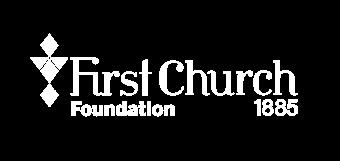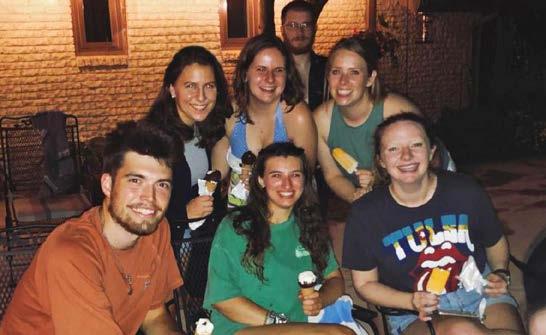
6 minute read
Wednesdays, March 9 - April
Masterwork Academy Piano Lab Vision
As we are created in the image of God, he made us ”to create“ and enjoy his gift of music. We hope to inspire, teach and help students create music of their own.
Advertisement
– From the Masterwork vision statement.
Masterwork students in the piano lab.
“Most kids already have an interest in the piano and kids with no prior exposure are less intimidated in a group setting,” she said. Geri will be teaching fingering technique and music theory, helping the children build fingertip muscles, and leading them to compose songs independently using rhythms, sounds, etc.
Geri is hopeful that the children will be able to build a repertoire of praise songs, including duets and quartets. “They learn so quickly and it gives them such a sense of accomplishment,” she stated. Inspiring them to pursue music beyond their days at Masterwork Academy is also a goal of the program. Geri is currently working on a music curriculum that can permanently remain with Masterwork.
As Jenette and Duff began sharing their dream, I don’t know if they used the exact same words that Joseph declared to his brothers in Genesis, but no matter. Like Joseph’s rise to power and being positioned to aid his family and an entire nation, so the dream of a piano lab that can excite, inspire and reveal creative mysteries has come to Masterwork Academy.
– Geri Stites


The secret garden of spiritual practice

By Julia Metcalf
It is one thing to have faith, to believe, but we are not called to just believe, we are called to discipleship to Christ in which we also practice faith. Practice, as defined by the Merriam-Webster dictionary, is “To do something regularly, as an ordinary part of your life.” Practice is, in essence, a transition from the head to the heart, the mind to the body. It is a deliberate move that requires stepping away from the noise of daily life.
As early as the 1st century AD, devoted followers of Jesus Christ made their way into the wilderness to remove themselves from the things that distracted their hearts, minds and souls from loving the Lord. Some hunkered down in caves and lived alone as hermits like St. Anthony, “Anthony the Great.” Others created communities which upheld collective rhythms, or a “rule of life,” such as the Benedictine monks or the Carmelite nuns.
For those reading this, however, that is not the particular call on our lives, and yet we too are invited to “Love the Lord our God with all our hearts, all our souls, and all our minds.” For us, the wilderness is not a physical place set apart from society, but rather a spiritual posture we assume. It is an approach with daily devoted practices which help us embody the statement from the prophet Jeremiah, “You will seek me and find me, when you seek me with all your heart,” (Jeremiah 29:13.)
Perhaps this wilderness can be created through our own rhythm of life – the way in which we reorder our days around our devotion to Jesus. Such a restructuring makes time for reading the word, engaging in worship and sitting still in God’s presence. Through continuous practice, the wilderness becomes a secret garden, where silence feels more like peace, and where the living water is plentiful and abundant. With time, practice makes us feel directly connected to the source of true life (John 4:14) and more grounded in the truth of the Lord.
Finding your own practice is accessible through spiritual disciplines that have been passed down to us through centuries of devoted Christ-followers. They encompass a large swath of tools, exercises, and postures with which we bring ourselves to the foot of the throne and are transformed by the presence of God. Disciplines, however, do require … well, discipline! But such discipline becomes joy through the daily choice to cultivate a closer relationship with Christ.
Will you join me on this journey as we explore practical ways to apply the spiritual disciplines to your life? Look for a follow-up story complete with a resource list in the next issue of Tidings.
– Julia Metcalf


Building a legacy

By Katie Williams
On any Sunday morning or at various times during the week, congregants find community, support and faith building experiences at First Presbyterian Church of Tulsa. It becomes our home, our family, and a place where we want to raise our children, grow closer to God and feed our faith. That is why the First Presbyterian Foundation is such an integral part of the life of the church.
We not only support the life of the church, but also take care of the facilities. I remember walking these halls first as a child and now an adult. Although the surfaces have changed, the foundations have not. I want my daughter and future grandchildren to walk in those same halls. That is why I am a Legacy Society member.
In 2004, the Board of Trustees developed the Legacy Society. To join, it is a donation of $1,000. It was a way to bring together the people who had dedicated their blessings through bequests to the church. They are the true foundation that generations to come will build on to continue the incredible mission of First Presbyterian Church. Their like-mindedness and vision to share their gifts beyond their lifetimes were the standard the foundation was built on.
What legacy do you want to leave? As you look around the church and see the people who are wearing the legacy pin, ask them why? I think we all have a story about the connection we have at First Presbyterian and joining the Legacy Society will make sure the future generations have those same opportunities. Over the next year, there will be several gatherings for society members and people who want more information. If this interests you, please call Katie Williams 918-292-9063 or email kwilliams@FirstChurchTulsa.org for more information on joining the Legacy Society and how to give to the foundation.
“I am the true vine, and My Father is the vinedresser. Every branch in Me … that bears fruit, He prunes it so that it may bear more fruit.” – John 15:1-2

Legacy Society members Lindsey and Todd Schuster.




College students find community in UKirk
By Julia Metcalf
The UKirk College Ministry continues to grow. Olivia Martin, a sophomore at The University of Tulsa says that UKirk has provided her with, “A place to grow closer to the Lord, people who push me to be better, and space to be as real and broken as I need without being judged.”
UKirk meets Tuesdays and Sundays and you can find them on Instagram @UKirkTulsa. Or, contact Julia Metcalf at jmetcalf@FirstChurchTulsa.org.

UKirk friends (back) Julia Campbell, Olivia Martin, (front) Lydia Campbell, Gigi Goebel.

Julia Metcalf with Lydia Campbell and Bella Nolley. UKirk members at summer Float & Flick event.





